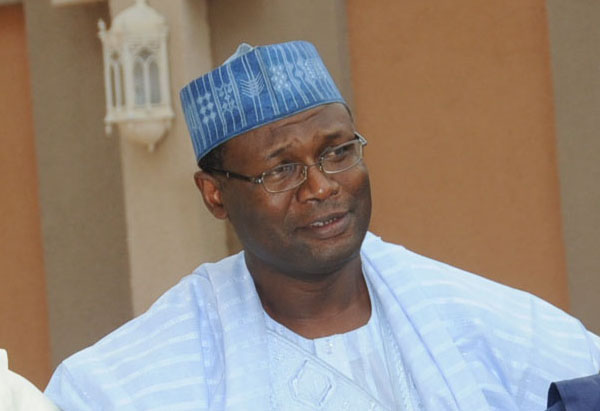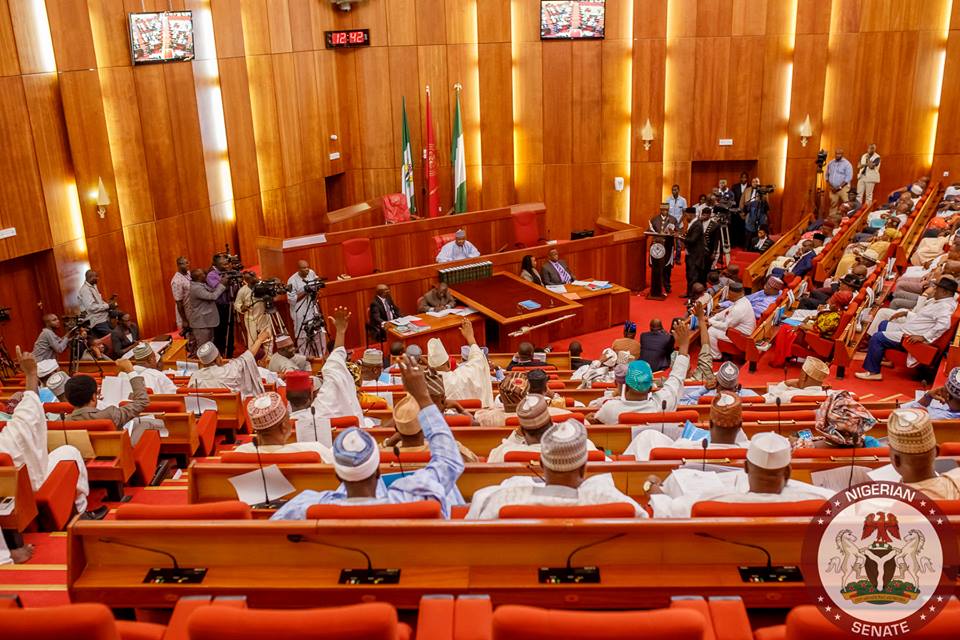Calixthus Okoruwa is the chief executive officer of communications management consultancy, XLR8 (pronounced, “excelerate”). His multidisciplinary background spans sales management, social health advocacy, journalism, advertising management and public relations in industries that include pharmaceuticals, public health, print media, international air express and logistics, as well as telecommunications.
In the three years preceding his founding of XLR8, he was MTN Nigeria’s pioneer head of public relations. Having keenly followed the telecommunications industry ever since, Okoruwa spoke with TheCable on the decision of the Nigerian Communications Commission (NCC) to fine telecommunications firm MTN a sum of N1.04 trillion for failing to deactivate (within stipulated deadlines) 5.1 million unregistered subscribers:
This N1.04 trillion sanction against MTN, it is the biggest fine in the history of telecommunications in Nigeria, and it’s been said in a few places that the sanction is excessive.
That the fine is excessive is not in question. Infact, it beggars belief. I think that it is so ridiculous that the ripple effects will be with us for a long time. Investors are not likely to forget that this is one country where a regulator can summarily impose a fine to the tune of billions of dollars on a telecom operation. The entire industry should be worried because this will considerably jeopardize investor confidence for a long time to come.
Advertisement
It is believed in NCC and state security circles that MTN’s database contained phone numbers of kidnappers, insurgents, miscreants, armed robbers and other criminals. Would you say MTN did enough to rid its database of security threats?
A telecom company is not a security company. The role of determining security threats is that of government and its security organs. I believe that what was required of each telecom firm was to ensure that every phone user was registered. Do telecom firms have the capacity to determine the veracity of claims that customers have been made? I don’t think they do. If I bought a SIM and told the telecom firm that I live on Barack Obama Street in Kotangora, does it have any means with which to verify if this is correct? Is there a central data base of Nigerians that it can contact to verify the details of SIM registrants? In each case, you will find that the answer is no. These companies were requested to register SIMs of their customers and I believe they did this to the best of their abilities and within the constraints of an operating environment that you cannot particularly say is an easy one.
NCC says it gave MTN a 12-month grace to deactivate unregistered lines. Do you think MTN did enough to comply, within this time frame?
Advertisement
I believe this is better answered by MTN. I do not speak for MTN and currently have no association with MTN in any way. My reaction is strictly from the perspective of an informed third party who has been connected with Nigeria’s telecom industry for many years.
At the end of 2014, MTN Nigeria declared a revenue of N840.80 billion. How does it hope to pay a fine of N1.04 trillion?
I do not have the exact figures. But this again speaks to the ludicrousness I alluded to in your first question. Regulators need to understand and appreciate that theirs is a very delicate balancing role. They need to balance the interests of government, customers and investors.
Where this balance is tilted then something goes wrong. In this particular case where a strong negative signal has been sent to investors, the reverberations will remain for a long time and it is the customers and the government that will end up the loser. This is ironic, given that the CDMA industry has since collapsed, as you know; and given that the GSM industry itself is struggling.
Advertisement
At least one of the GSM companies has yet to break even. It needs more and more investment if it is to achieve this. The others still have a definite need to expand the scope of their operations and avail Nigerians of better quality of service. All the telecom companies also need to invest heavily in broadband, in literally wiring up our country. Clearly, it will be several times more difficult to access financing to do any of these now, in the face of this very tragic fine which the NCC says it has imposed on one operator.
You probably heard of the slump in MTN’s share price in the wake of the announcement. That is the way investors, including lenders and venture capitalists, react when things like this happen.
What do you think are the larger-picture implications of this fine for the telecommunications industry, seeing that MTN controls 43 percent of the market?
As I said earlier it is tragic for the market. I see it being reversed, but the damage has already been done. That anybody ever contemplated it at all, let alone announced it to the world, just beats me. I don’t understand how and why any regulator would slam such a ridiculous fine on an operator. It sends very strong negative signals to the world and will have negative implications for the ability of the overall telecom industry to raise financing in the years to come.
An industry expert says if it was his decision, he would rather pull MTN out of the Nigerian market than pay the fine. Do you see MTN adopting this option? And what are the consequences for the country, should that happen?
Advertisement
The fine is actually equivalent to saying “close shop”. But I don’t think this is what the regulator hoped to achieve, which is why I have said I believe that the fine will be reversed. Nobody can afford an MTN closing shop in Nigeria. The ripple effects on the overall economy including security itself would be calamitous. I strongly believe that the pronouncement will be reversed.
I’m happy that MTN and the NCC are currently engaging each other. My only regret and a big one at that, is that this was allowed to happen in the first place. Investor confidence is now badly shaken and will take some time to recover. This was very unnecessary. It is like imposing a sentence of 400 years imprisonment for a traffic offence.
Advertisement
Finally, do you see this landmark fine as a positive step towards firm regulation of the industry?
Not at all. With due respect to the NCC, this is making a mockery of regulation. I am very relieved that previous helmsmen at the NCC did not make rulings of this nature. If they did, we would not have had any telecom industry today. All the investors would have long taken leave of our country. Firm regulation is not only about “fines” and sanctions. Regulation must carefully balance all interests, each party is important. Without customers, there will be no investors and without investors there will be no customers. Without conducive government policy well implemented by far-sighted regulators, there will be no industry – neither customer nor investor. All of these must always be taken into cognizance. Regulation is a delicate job. It demands careful understanding of the issues but to borrow the Ben Murray-Bruce phrase, also entails the application of “common sense”. It is not rocket science.
Advertisement
5 comments







I used to respect this guy. Now he has lost it all. Why did other operators fall in line and MTN did not? Did MTN not know the consequencies of breaching the rules and the heavy penalty of N200k per line? Why defend the indefensible? It would have made sense if he is pleading for a reduction but his defence smack of slavish attachment to a company that makes a game of fleecing Nigerians everyday.
My kudos to the NCC and the new head. This shows that we have a government that is not ready to do business as usual. MTN should pay up or pack up. Nigerian firms who tried to operate in South Africa were not allowed to break the rules. Why should Nigeria continue to allow a South African company break our rules, even in the face of security challenges?
If you don’t get it, or don’t understand NCC’s rationale for imposing that amount or just don’t like it, that’s fine. But trying to fault NCC’s action makes you sound ignorant. You spent the first parts answering questions on behalf of MTN and when the real question warranting the fine is being asked, you suddenly do not speak for MTN.
Yes the fine is excessive, it was designed that way so that defaulting on it should be avoided. it is not ridiculous and yes the ripple effects will be with us for a long time. Investors will now know it is no longer business as usual. Various multinationals have blatantly disobeyed regulators orders far too many times, MTN in particular is notorious for this. Now in a bid to deceive investors about its subscriber base, MTN executives have attracted to the company what they wanted to avoid.
A telecom company is not a security company but they are meant to corporate with the security agencies is curbing crimes and fighting terrorism. Commercial banks in Nigeria are not security companies, but the onus is on them to verify the business and addresses of their customers. Failure to do this attracts fines by the financial regulatory body. I’ve not heard any bank complaining. Now why shouldn’t telcos do the same when the bearing their inactions have on security is monumental.
Just because MTN made N840.80 billion profit in 2014 does not mean it shouldn’t be fined more than that. This is inconsequential to the fine the offence it committed attracts. Its like saying if I intentionally use a N5 nail to damage the body of N5 million car then i shouldnt be fined more than N5. MTN knew the penalty for non adherence to the directive attracts a fine of N200k per line. They should have protested the fines before they committed the infraction and not after. This clearly shows that they deliberately disobeyed thinking it will be avoided as they’ve always done.
The monies the various government agencies have used to fight insurgency is in the trillion dollars range. I’m not saying MTN should be punitively blamed for all these monies but their inaction is simply irresponsible, disrespectful and fraudulent as they have taken the security agencies steps back in the fight against crime and insurgency in the country. I’m sure they will never disobey regulators in other countries the way they do with reckless abandon in Nigeria. The fine no doubt should be based on what the regulators have worked out and if it is N1.04 trillion let them pay up. Retracting or reducing the fine will send a bad signal to investors and other firms that regulators directives could be disobeyed and fines avoided. Additionally, it would not be fair to other telcos who complied to that directive.
Cable, I am extremely disappointed in this your guest who as a professional is expected to be very objective and global in his views even if he will not be patriotic as a Nigerian, he should not try to pull wool over the eyes of his Nigerian readers. He talks as if his interviewers and readers are fools. Talking about scaring away investors as if they are not subject to rules and regulations of the place where they conduct their business. He is totally biased and people like this should be quizzed by security agents for misleading Nigerian and other readers but for freedom of speech. His comments smacks of nothing but intimidation of the regulatory agency and publicity job for MTN who was at a time his paymaster. The NCC gave ample time to all the carriers. Others complied but not MTN because they think NCC is still as corrupt and docile as before when they can bribe them with free recharge cards so that they look the other way and allow MTN grafts. This issue of unregistered sims is a very sensitive security matter and MTN may have been closed down in other clime. Okoruwa talks of a GMS operator grappling to survive. That is the newest entrant and we all know there is a gestation period for every business and ofcourse the guys knew the market was already taken by the earliest entrants before going into the business and that can not be enough reason to break the rules. We all know what happened to BP in the US even with a genuine mistakes of oil pollution. The MTN infraction is a flagrant disregard by a corporate body for the rules of a regulatory agency. MTN had ample time to disconnect the unregistered sims but refused to. BP today has returned to trading in Africa because of the heavy penaly of $18.7 imposed on them in the US. For your information Mr Marketing Expert, BP Capitalization is $109b. The penalty is 17% of BP capitalization. Paribas Bank of France with a market capitalization of $67b was fined $9 by the US for a singe infraction and heaven did not fall. It is only in Nigeria that we abuse our own institutions when they do the right thing, how then can we strengthen the institutions. It is in the imagination of people like you that NCC is talks with MTN to reverse the fines. If they are in talks at all, its about how they will pay. They don’t necessarily have to pay in one financial year Mr Expert. Its a deterrent measure and wake up call for the shareholders to change their management if they want to remain in business. The fines could also be tax allowed in their Headquaters but not in Nigeria. The next thing I want to see our tax authority do right is to start checking the books of multinationals now that their is a new Sheriff in town for over-invoicing and transfer price technics that they use is fleecing funds out of Nigeria and thereby causing unnecessary pressure for Naira. Their accomplices like Okoruwa should not be spared.
This fine is ridiculous and arbitrary. Mr. Okoruwa is spot on! The problem is that many Nigerians are blinded by tribal sentiments against South African businesses that are flourishing in Nigeria. The question we should ask ourselves is what the true function of a regulator is.
Some have been quick to point out that MTN knew the stakes and the basis for calculating the penalty. Let’s not forget that first and foremost, MTN and the other telcos have no business capturing and storing the private data of Nigerians! This is the sole preserve of the Federal Government. The fact that the NCC and the FG have failed in this responsibility by shifting the buck to private companies is shameful. Let’s face the fact: whether or not mtn pays the fine, it will not affect the quality of service delivery in the sector. This is because the regulator has deviated from its core mandate and decided to chase shadows.
I hope the interviewee realized that MTN actually signed the MOU with the NCC to the effect that unregistered SIM should be disconnected and the consequences of failure. Anyway I was expecting too much for him to say otherwise